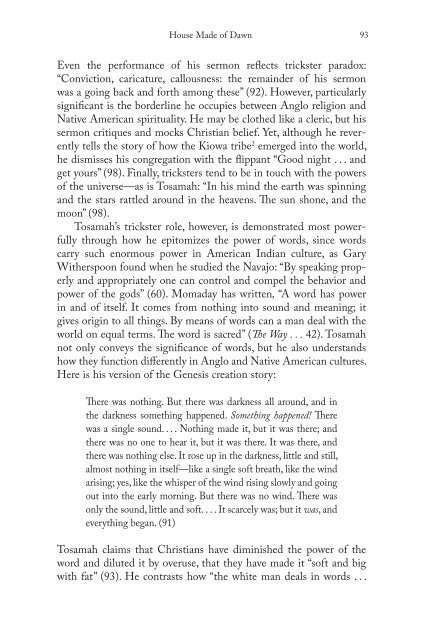Blooms Literary Themes - THE TRICKSTER.pdf - ymerleksi - home
Blooms Literary Themes - THE TRICKSTER.pdf - ymerleksi - home
Blooms Literary Themes - THE TRICKSTER.pdf - ymerleksi - home
You also want an ePaper? Increase the reach of your titles
YUMPU automatically turns print PDFs into web optimized ePapers that Google loves.
House Made of Dawn 93<br />
Even the performance of his sermon refl ects trickster paradox:<br />
“Conviction, caricature, callousness: the remainder of his sermon<br />
was a going back and forth among these” (92). However, particularly<br />
signifi cant is the borderline he occupies between Anglo religion and<br />
Native American spirituality. He may be clothed like a cleric, but his<br />
sermon critiques and mocks Christian belief. Yet, although he reverently<br />
tells the story of how the Kiowa tribe 2 emerged into the world,<br />
he dismisses his congregation with the fl ippant “Good night . . . and<br />
get yours” (98). Finally, tricksters tend to be in touch with the powers<br />
of the universe—as is Tosamah: “In his mind the earth was spinning<br />
and the stars rattled around in the heavens. Th e sun shone, and the<br />
moon” (98).<br />
Tosamah’s trickster role, however, is demonstrated most powerfully<br />
through how he epitomizes the power of words, since words<br />
carry such enormous power in American Indian culture, as Gary<br />
Witherspoon found when he studied the Navajo: “By speaking properly<br />
and appropriately one can control and compel the behavior and<br />
power of the gods” (60). Momaday has written, “A word has power<br />
in and of itself. It comes from nothing into sound and meaning; it<br />
gives origin to all things. By means of words can a man deal with the<br />
world on equal terms. Th e word is sacred” (Th e Way . . . 42). Tosamah<br />
not only conveys the signifi cance of words, but he also understands<br />
how they function diff erently in Anglo and Native American cultures.<br />
Here is his version of the Genesis creation story:<br />
Th ere was nothing. But there was darkness all around, and in<br />
the darkness something happened. Something happened! Th ere<br />
was a single sound. . . . Nothing made it, but it was there; and<br />
there was no one to hear it, but it was there. It was there, and<br />
there was nothing else. It rose up in the darkness, little and still,<br />
almost nothing in itself—like a single soft breath, like the wind<br />
arising; yes, like the whisper of the wind rising slowly and going<br />
out into the early morning. But there was no wind. Th ere was<br />
only the sound, little and soft. . . . It scarcely was; but it was, and<br />
everything began. (91)<br />
Tosamah claims that Christians have diminished the power of the<br />
word and diluted it by overuse, that they have made it “soft and big<br />
with fat” (93). He contrasts how “the white man deals in words . . .

















